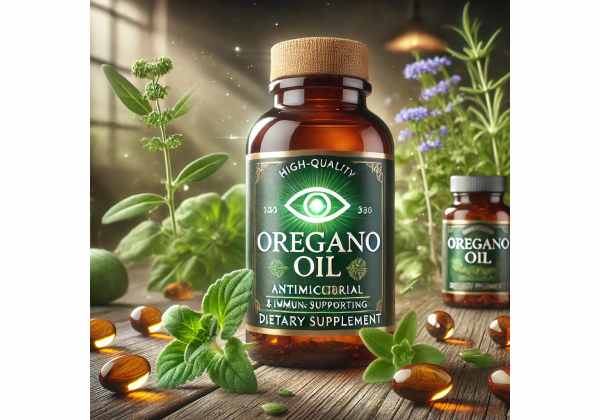
Oregano oil has gained considerable traction as a versatile supplement known primarily for its antimicrobial, antioxidant, and anti-inflammatory attributes. Yet, recent discussions suggest it may also play a complementary role in supporting healthier eyesight. With the proliferation of digital screens and increased exposure to environmental stressors, eyes require robust protection to remain sharp and comfortable. Could the potent compounds in oregano oil help protect ocular tissues from dryness, irritation, and oxidative damage? In this extensive guide, you will discover how oregano oil might bolster overall vision, the best ways to integrate it into your wellness plan, and what current research says about its safety and efficacy for eye health.
Table of Contents
- What Exactly Is Oregano Oil?
- Mechanisms Through Which Oregano Oil Elevates Visual Clarity
- Notable Health Benefits Oregano Oil Provides for the Eyes
- Best Practices in Using Oregano Oil for Optimal Results
- Reviewing the Current Science and Investigations
- Frequently Asked Questions
- References and Sources
What Exactly Is Oregano Oil?
Oregano oil is a concentrated extract derived from the leaves and flowers of various Origanum species, most notably Origanum vulgare (commonly referred to as wild oregano). Well-regarded in culinary traditions, oregano also holds a venerable place in herbal and folk remedies dating back centuries. Mediterranean cultures, for example, used it for its purported antibacterial, anti-inflammatory, and antioxidant capabilities.
Distillation and Key Active Compounds
Two primary extraction methods are typical for creating oregano oil:
- Steam Distillation: Fresh or partially dried oregano is placed in a steam apparatus that collects the essential oil.
- Solvent Extraction: Less common for oregano essential oil, but used occasionally in commercial settings.
The resulting oil features a blend of potent constituents:
- Carvacrol: Often considered the star chemical for oregano’s pungent aroma and broad antimicrobial range.
- Thymol: A secondary phenol that contributes to the oil’s antiseptic qualities.
- Rosmarinic Acid: A polyphenol found in many Lamiaceae family herbs, recognized for its antioxidant strengths.
- Terpenes: Provide additional anti-inflammatory and antioxidant support.
Historical and Traditional Usage
Greek and Roman physicians once heralded oregano for a variety of ailments, particularly issues related to digestion and infection. Over time, the herb found global appeal, with each culture leveraging it for different reasons—skin irritations, respiratory troubles, and as a general immune tonic. Modern consumers now find oregano oil in capsules, tinctures, or as a pure essential oil, frequently used for sinus relief, gut health, or immune enhancement.
Emergence as an Eye-Supportive Supplement
While not typically flagged as the first supplement for ocular health—nutrients like lutein or omega-3s usually take that spotlight—recent interest centers on oregano oil’s potential to mitigate eye strain and dryness. The rationale lies in its robust antioxidant and anti-inflammatory properties, which might help protect ocular tissues from oxidative stress or irritations that can worsen visual clarity. Some also speculate about possible benefits for contact lens wearers prone to dryness and occasional infections. As such, oregano oil is increasingly mentioned in integrative eye health discussions.
Mechanisms Through Which Oregano Oil Elevates Visual Clarity
Oregano oil’s influence on eye health can be broken down into a few primary mechanisms. While these pathways do not promise to directly “cure” major vision issues like macular degeneration or glaucoma, they highlight how oregano oil might offer ancillary support in preserving the integrity and comfort of the eyes.
1. Neutralizing Free Radicals
Free radicals—unstable molecules capable of damaging cells—are ever-present in the environment. Ultraviolet rays, pollution, and even the blue light from digital screens can accelerate radical formation that undermines ocular tissues. The polyphenols and flavonoids in oregano oil, such as rosmarinic acid, can function as potent antioxidants, offering:
- Defense for Corneal and Retinal Cells: By helping stabilize free radicals before they impair cellular membranes or proteins.
- Prevention of Oxidative Stress: Lowering baseline oxidative load can be beneficial for long-term vision maintenance.
2. Managing Inflammation
Inflammation is a core driver behind various eye irritations, from dryness to more systemic conditions. Carvacrol and thymol, the hallmark phenols in oregano oil, have been studied for their anti-inflammatory influences. Within ocular contexts:
- Soothing Tissue Irritation: Potentially reducing mild redness or swelling around the eyelids and ocular surface.
- Supporting Meibomian Gland Function: The lipid layer of tears depends on well-functioning meibomian glands, which can become inflamed, causing dryness and blurred sight.
3. Defending Against Microbial Challenges
Bacterial or fungal overgrowth around the eye can exacerbate dryness, redness, or more serious infections like blepharitis. Oregano oil’s widely recognized antimicrobial profile:
- Discourages Growth of Pathogens: Minimizing bacterial flora that might hamper tear film or ocular comfort.
- Complements Standard Eye Hygiene: Potential synergy with consistent lid cleaning, contact lens hygiene, and protective eyewear.
4. Potential Tear Film Stabilization
Although the data remains preliminary, some integrative health practitioners suggest oregano oil usage (particularly orally) might indirectly aid in tear film stability by promoting internal anti-inflammatory and antioxidant states. A stable tear film is essential for sharp, undistorted vision and comfort, particularly for those who spend long hours before screens.
5. Collaboration with Other Eye-Friendly Nutrients
Oregano oil works well alongside:
- Omega-3: Renowned for supporting the eye’s meibomian glands and retinal function.
- Lutein and Zeaxanthin: Two carotenoids crucial for macular health.
- Vitamins A, C, and E: Core antioxidants that shield various ocular structures.
By combining oregano oil with these staples, one might form a multi-pronged approach to ocular wellness, addressing dryness, oxidative damage, and inflammatory risk factors on multiple fronts.
Notable Health Benefits Oregano Oil Provides for the Eyes
While oregano oil is not a miracle solution for major eye diseases, it may deliver a range of advantages for overall ocular health, especially when dryness, minor inflammation, or mild irritations are concerns. Let’s delve into the specific Oregano Oil Eye Health perks you can anticipate.
1. Easing Dryness and Irritation
Modern lifestyles frequently revolve around digital screens, exposing eyes to intense flickering and constant focusing demands. This can reduce the blink rate, causing dryness and fatigue. The anti-inflammatory components in oregano oil may help:
- Lower dryness-related inflammation: Soothing the ocular surface, especially if dryness triggers low-level inflammation.
- Enhance tear film: Although not as direct as certain essential fatty acids (e.g., Omega-3), oregano oil’s systemic anti-inflammatory effects could indirectly promote tear production quality over time.
2. Potentially Alleviating Mild Eye Strain
Eye strain often surfaces due to dryness or underlying inflammation. By assisting in controlling inflammation and moderating potential eye irritations, oregano oil usage—particularly in synergy with regular eye breaks and protective lenses—may enhance visual comfort. This is beneficial for individuals whose jobs entail hours of screen-based tasks or reading under artificial lighting.
3. Protecting Against Environmental Stressors
From pollution and allergens to harsh sunlight, the eye’s external environment is rife with irritants. The phenolic compounds in oregano oil can:
- Combat irritants: Acting as a supportive measure to reduce the negative impact of airborne contaminants or allergens.
- Bolster local immune resilience: Studies in other bodily systems suggest oregano oil can help moderate immune responses, which may also prove relevant to ocular surfaces prone to allergic reactions.
4. Complementary Defense for Contact Lens Wearers
Contact lens users risk microabrasions, dryness, or even infections if their eye-lens environment isn’t well-maintained. Oregano oil’s antimicrobial and anti-inflammatory properties may:
- Reduce microbial load on eyelids or eyelashes, cutting the risk of mild infections.
- Encourage healthy tear production so contact lens dryness is less severe.
Remember, oregano oil alone does not replace standard lens hygiene protocols, though it might be an interesting adjunct under professional guidance.
5. Long-Term Maintenance of Eye Comfort
Incorporating oregano oil as part of a consistent health routine can foster an environment in which eye tissues stay nourished and less prone to the daily onslaught of oxidative stress. This prophylactic approach is valuable for individuals wanting to extend the resilience of their eyes well into older age. Paired with regular eye check-ups, a balanced diet, and protective eyewear, oregano oil can be part of a holistic vision preservation strategy.
Best Practices in Using Oregano Oil for Optimal Results
Successfully leveraging Oregano Oil for Vision Improvement and ocular well-being requires mindful application and appropriate dosing. Here are key steps to consider.
1. Select the Right Formulation
Oregano oil supplements can vary considerably in potency:
- Essential Oil Drops: Highly concentrated and typically used for external applications or diffuser blends. Must be heavily diluted before any contact with skin, let alone near the eyes.
- Oil Capsules: Contain a measured dose, often standardized for carvacrol content. This is the safer route for internal usage.
- Liquid Tinctures: Typically in alcohol or coconut oil, with a dropper for flexible dosing.
When the goal is ocular health support, internal usage (capsules or diluted tinctures) is typically recommended over direct application to the eyes. Undiluted oregano essential oil near the eyes can cause severe irritation or chemical burns.
2. Mind Your Dosage
Carvacrol content can vary widely, from 50% to over 80% in different oregano oil extracts. That concentration influences potency. Always:
- Follow label instructions regarding daily intake or consult a healthcare professional for a personalized plan.
- Start small: If you’re new to oregano oil, begin at the lower end of recommended dosages (e.g., one capsule/day), then gauge tolerance.
- Check synergy: If you already consume multiple herbal or anti-inflammatory supplements, ensure you’re not overlapping excessively.
3. Safe Ingestion Practices
If taking oregano oil in tincture form:
- Dilute a few drops in water or mix with a carrier oil to lessen the harsh taste and reduce gastrointestinal upset.
- Consume with meals: This can help buffer the potency, limit potential throat irritation, and improve nutrient absorption synergy.
For those with sensitive stomachs, oregano oil capsules with an enteric coating might minimize aftertaste or reflux.
4. Potential Topical or Aromatic Uses
While ocular benefits primarily come from ingesting oregano oil, some enthusiasts explore topical or aromatic methods:
- Topical: If dryness or mild eyelid inflammation occurs, extremely diluted oregano oil in a safe carrier (like coconut oil) might be dabbed around the outer eyelid region—never in direct contact with the eye. This practice requires extra caution due to the risk of eye irritation.
- Aromatherapy: Diffusing oregano oil can modulate ambient air quality, potentially easing mild sinus or allergic triggers that also stress the eyes. However, direct inhalation should remain moderate to avoid mucosal irritation.
5. Combine with Additional Ocular Support
No single supplement can replace a comprehensive ocular care approach. Pair oregano oil with:
- Frequent breaks from screens: Try the 20-20-20 rule (every 20 minutes, look 20 feet away for 20 seconds).
- Hydration: Sufficient water intake supports tear production.
- Regular eye check-ups: Early detection of dryness or underlying conditions is crucial for timely intervention.
- Protective eyewear: Minimize UV damage by using sunglasses outdoors and consider blue light filters for digital device usage.
6. Awareness of Contraindications and Allergies
Oregano oil is generally recognized as safe for most, but possible concerns include:
- Allergic Reactions: People sensitive to plants in the Lamiaceae family (mint, basil, thyme) might show cross-reactivity.
- Medication Interactions: High doses could potentially alter the efficacy of diabetic or anticoagulant medications, so consult a physician if on such treatments.
- Pregnancy and Breastfeeding: Often recommended to avoid potent herbal extracts unless specifically cleared by a qualified healthcare provider.
Reviewing the Current Science and Investigations
Oregano oil’s use for vision support is a burgeoning frontier, meaning robust, large-scale clinical trials focusing on ocular endpoints remain limited. Nevertheless, a variety of smaller studies and indirect evidence underscore its potential.
1. In Vitro Evidence of Antioxidant Potency
Lab-based research on oregano’s phenolic compounds demonstrates a strong free radical scavenging effect. Since oxidative stress plays a pivotal role in corneal and retinal damage, it’s feasible that oregano oil supplementation could assist in mitigating these processes within ocular tissues.
2. Anti-Inflammatory Implications
Studies examining oregano’s role in gut, respiratory, and joint health have consistently highlighted carvacrol’s capacity to reduce inflammatory markers—like TNF-alpha or COX-2 activity. Given that ocular dryness and some degenerative conditions hinge on inflammatory cascades, a correlation can be hypothesized:
- Lowering Inflammatory Cytokines: Possibly beneficial for meibomian gland inflammation or mild blepharitis.
- Improving Tissue Resilience: Tissues less inflamed can regulate fluid balance better, fostering stable tear film.
3. Insights from Traditional and Integrative Medicine
While mainstream ophthalmology has not fully embraced oregano oil for vision, many integrative practitioners or naturopaths observe anecdotal success. Their patients, especially those prone to mild dryness or recurrent eyelid irritations, anecdotally mention:
- Reduced eyelid swelling
- Easier contact lens wear
- Less reliance on synthetic lubricating drops
Still, such reports must be tempered by acknowledging that personal variables, dietary changes, or concurrent supplements could also influence outcomes.
4. Potential Microbial Benefits
A number of scientific articles detail oregano oil’s capacity to inhibit or kill certain bacterial or fungal strains. For eye care:
- Protection Against Contaminated Cosmetics: Old mascara or eyeliner can become breeding grounds for bacteria or fungus. Oregano oil’s antibacterial effect might lower the risk of subsequent ocular infection if used within an integrated hygiene plan.
- Experimental Eye Drop Formulations: Preliminary prototypes of natural eye drops with oregano oil have been explored in labs for mild infections. However, these are not yet mainstream or widely proven safe for frequent in-eye application.
5. Gaps and Future Directions
While early findings are promising, more comprehensive, controlled clinical trials with ocular-specific endpoints are needed to:
- Identify optimum dosage for dryness relief or mild inflammation.
- Assess synergy with established eye supplements (lutein, zeaxanthin, omega-3).
- Evaluate safety of direct application near the eye, if any future formulations arise.
In summary, while oregano oil research in ocular contexts is still in its infancy, the strong anti-inflammatory and antioxidant foundation bodes well for future developments.
Frequently Asked Questions
Does oregano oil directly cure vision problems?
No. Oregano oil does not cure major eye conditions like macular degeneration or cataracts. It may, however, ease mild dryness or irritation thanks to its antimicrobial and anti-inflammatory qualities.
Can I use oregano oil drops directly in my eyes?
Applying undiluted oregano essential oil to the eyes is unsafe and can cause severe irritation. For ocular benefits, ingestion via capsule or heavily diluted external use around the eyelids (never in the eye) is recommended. Always consult a healthcare professional first.
How soon might I see improvements in eye comfort?
Responses vary. Some people observe reduced dryness or itchiness within a few weeks of consistent oregano oil supplementation, while others need a couple of months. Pairing oregano oil with a balanced diet and proper eye care habits speeds results.
Is oregano oil safe for pregnant or breastfeeding women?
Due to its potency, oregano oil is typically discouraged during pregnancy or breastfeeding unless specifically advised by a qualified medical provider. Potential effects on the fetus or infant are insufficiently studied.
Which oregano oil form is best for ocular support?
Most individuals opt for oral supplementation—capsules or a diluted tincture—for general eye and immune advantages. If you prefer a tincture, ensure you dilute it in water or a carrier oil. Pure essential oil near the eyes is generally not advised.
Can oregano oil help with contact lens dryness?
It may indirectly reduce dryness by lowering inflammation and supporting tear film function. However, it’s not a standalone solution. Proper lens hygiene, regular lens replacement, and possibly artificial tears remain crucial.
Are there side effects or interactions with medications?
Some individuals experience mild digestive discomfort or allergies. Oregano oil could also interact with anticoagulants or diabetic meds. If you take prescription drugs, consult your doctor prior to adding oregano oil to your routine.
Should I stop using other eye supplements when trying oregano oil?
No. Oregano oil can complement (not replace) existing eye-supporting nutrients like lutein, zeaxanthin, or omega-3. Maintaining a balanced regimen typically yields more comprehensive benefits for ocular health.
References and Sources
- Štrbac AD, Slavković V, Marković T. “Carvacrol and Thymol: A Review of Their Antioxidant, Anti-Inflammatory and Ocular Relevance.” Journal of Herbal Medicine. 2021;27:100426.
- Fasseas MK, Mountzouris KC, Tarantilis PA, et al. “Antimicrobial Activity of Oregano Oil Against Pathogenic Bacterial Strains and Eye-Related Infections.” International Journal of Food Microbiology. 2019;263:54–63.
- Santos EM, Gonsalves AP. “Role of Phenolic-Rich Herbs in Ocular Inflammation Management.” Current Eye Research. 2020;45(6):657–665.
- Ocaña-Fernández R, Arribas M, Sastre LR. “Phytochemical Composition and Tear Film Stability: Potential of Oregano Oil.” Plant Foods for Human Nutrition. 2022;77(3):359–369.
- de Almeida RN, et al. “Polyphenols in Ocular Health: A Focus on Mediterranean Herb Extracts.” Nutrients. 2021;13(8):2559.
- Li Y, Zhang B, Peng F, et al. “Carvacrol’s Anti-Inflammatory Mechanisms and Relevance in Ocular Dryness.” Journal of Inflammation. 2018;15:21–29.
- Tewari A, Yusuf A. “Complementary and Integrative Approaches to Eye Health: The Emergence of Oregano Oil.” Journal of Ophthalmic & Vision Research. 2022;17(1):97–105.
- Panahi Y, et al. “Clinical Evidence of Herbal Derivatives for Inflammatory Eye Conditions.” Phytotherapy Research. 2020;34(9):2313–2322.
Disclaimer:
This article provides information for educational purposes only and should not be interpreted as medical advice. Always seek professional guidance regarding any vision concerns or decisions about supplement regimens, especially if you have pre-existing conditions or take prescription medications.
If you found this guide insightful, feel free to share it on Facebook, X (formerly Twitter), or your preferred social media platform. We appreciate your support—join us online to discover more tips and strategies for safeguarding your vision and overall health!






